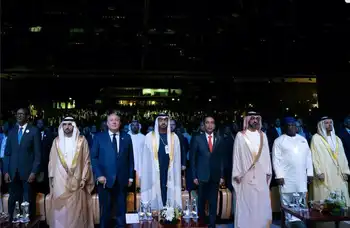U.S. acquiesces to allies on new Iran resolution Nuclear issue will not be referred to UN
- The United States, bowing to the wishes of its allies, has agreed to let the International Atomic Energy Agency adopt a resolution deploring Iran's nuclear program without referring the issue to the United Nations for possible sanctions, administration officials said.
A senior administration official said the resolution, which could be adopted Wednesday in Vienna, would say that the atomic energy agency strongly deplores Iran's 18 years of secretly developing a nuclear arms program and hint that further actions might be possible if such activity continues.
Yielding to the insistence of France, Britain and Germany, the administration backed off its demand that Iran be condemned and that allegations of its misconduct be referred to the UN Security Council. The three European countries have joined in an unusual coalition to press Iran to cooperate.
Administration officials said that in the end, the United States had little choice but to go along not only with the wishes of its European allies, but also with the urging of the atomic energy agency's leadership, most notably its director general, Mohamed ElBaradei.
The Europeans and ElBaradei argued that Iran's recent steps, including the announced suspension of its program to enrich uranium, warranted a conciliatory approach. Moreover, they said, confronting Iran would backfire, causing it to cut off any discussion.
Getting Iran to acknowledge that it has cheated in the past and that it will cooperate in the future may not be everything the United States wants, a European diplomat said. But to walk away from talking to Iran will block any chance of progress in the future.
On a visit to Washington last week, Joschka Fischer, the German foreign minister, also argued for keeping the dialogue with Iran open, telling reporters that it was better to reach out to the government in Tehran than to cut off the possibility of reducing tensions.
As part of the deal negotiated in Vienna, the United States got a clearer indication in the proposed resolution that all bets are off if Iran continues to flout the wishes of the world and presses ahead with making nuclear weapons, administration officials said.
We're pleased that we were able to reach agreement on a text of a resolution, a senior administration official said. It makes clear that if there are further failures by Iran, all options will be open.
Secretary of State Colin Powell negotiated the language over the weekend with senior envoys from Europe and with ElBaradei.
European diplomats said the negotiations had a sense of familiarity, given the fact that in the months leading up to the war with Iraq, ElBaradei joined with France and Germany in demanding that Iraq be given more time to come clean on its illicit weapons programs.
Britain and the United States opposed them, in the end giving up on getting Security Council authorization for military action against Iraq.
Diplomats said that the three countries had sent a powerful message as Fischer joined with the British foreign secretary, Jack Straw, and the French foreign minister, Dominique de Villepin, in arguing for talking with Iran.
At a time when American inspectors have still been unable to find evidence of the illicit arms programs in Iraq cited as a principal reason for going to war, the United States was dealing with the issue of Iran from a position of weakness, many diplomats involved in the matter said.
In Vienna last week, it was clear that after strenuous lobbying, Powell was unable to persuade more than three of the energy agency's 35 board members Canada, Australia and Japan to go along with a censure of Iran that would refer the matter to the Security Council.
While traveling with President George W. Bush last week in Britain, Powell declared that the wording desired by others on the agency board was deficient. ElBaradei argued, however, that a resolution that would keep talks with Iran going would be a resolution that strengthened his hand.
It was no secret in the nuclear discussions that the Bush administration has itself been divided on the issue. Administration hard-liners contend that continuing discussions with Iran are a kind of trap that would allow Iran to play for time while pressing forward with its nuclear program in secrecy.
Related News

Revenue from Energy Storage for Microgrids to Total More Than $22 Billion in the Next Decade
NEW YORK - A new report from Navigant Research examines the global market for energy storage for microgrids (ESMG), providing an analysis of trends and market dynamics, with forecasts for capacity and revenue that extend through 2026.
Interest in energy storage-enabled microgrids is growing alongside an increase in solar PV and wind deployments. Although not required for microgrids to operate, energy storage systems (ESSs) have emerged as an increasingly valuable component of distributed energy networks because of their ability to effectively integrate renewable generation.
“There are several key drivers resulting in the growth of energy storage-enabled microgrids globally, including the desire to…




